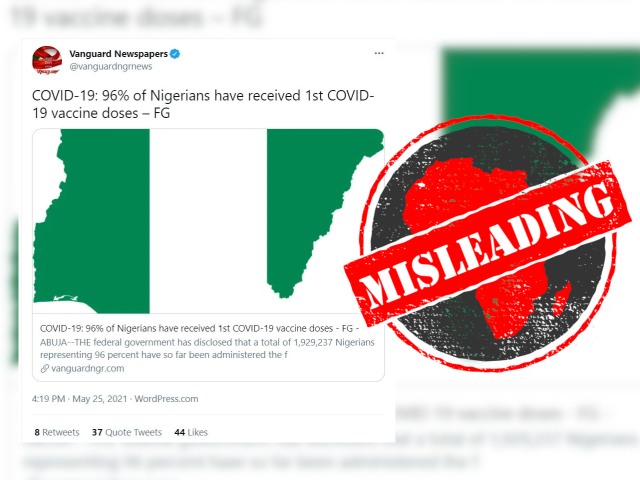The headline of an article on the Biafra Star website claims Nigeria’s former president Olusegun Obasanjo has suggested Nigeria is set to slide into a second civil war.
“Mark my word; There’ll be Another Second War in Nigeria very Soon — Obasanjo” it reads. The article and headline have been shared several times on Facebook.
But the headline’s warning isn’t anywhere in the 10-paragraph article. The text quotes Obasanjo extensively, but contains no reference to an impending war in Nigeria.

Obasanjo was Nigeria’s military ruler from 1976 to 1979 and its president from 1999 to 2007. In 1967 the southeast region of Biafra declared its independence from Nigeria, sparking a civil war that lasted until 1970.
The Biafra Star article is attributed to a Premium Times interview with Obasanjo. In the interview he criticised President Muhammadu Buhari’s government and said it was driving the “country towards disaster and instability and unsustainability”.
He spoke of a lack of confidence in Nigeria’s economy and discussed Buhari’s anti-corruption campaign. But he said nothing about war.
The word “war” is not mentioned in the Premium Times interview, nor in the text of the Biafra Star version of it.
The headline is therefore misleading. It does not match the content of the article. - Jennifer Ojugbeli
“Mark my word; There’ll be Another Second War in Nigeria very Soon — Obasanjo” it reads. The article and headline have been shared several times on Facebook.
But the headline’s warning isn’t anywhere in the 10-paragraph article. The text quotes Obasanjo extensively, but contains no reference to an impending war in Nigeria.

Headline does not match article
Obasanjo was Nigeria’s military ruler from 1976 to 1979 and its president from 1999 to 2007. In 1967 the southeast region of Biafra declared its independence from Nigeria, sparking a civil war that lasted until 1970.
The Biafra Star article is attributed to a Premium Times interview with Obasanjo. In the interview he criticised President Muhammadu Buhari’s government and said it was driving the “country towards disaster and instability and unsustainability”.
He spoke of a lack of confidence in Nigeria’s economy and discussed Buhari’s anti-corruption campaign. But he said nothing about war.
The word “war” is not mentioned in the Premium Times interview, nor in the text of the Biafra Star version of it.
The headline is therefore misleading. It does not match the content of the article. - Jennifer Ojugbeli
Republish our content for free
For publishers: what to do if your post is rated false
A fact-checker has rated your Facebook or Instagram post as “false”, “altered”, “partly false” or “missing context”. This could have serious consequences. What do you do?
Click on our guide for the steps you should follow.
Publishers guideAfrica Check teams up with Facebook
Africa Check is a partner in Meta's third-party fact-checking programme to help stop the spread of false information on social media.
The content we rate as “false” will be downgraded on Facebook and Instagram. This means fewer people will see it.
You can also help identify false information on Facebook. This guide explains how.





Add new comment